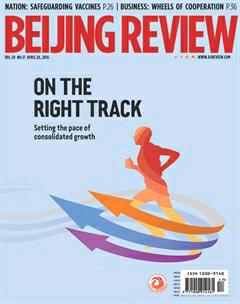Why Did a Prodigy Fail to Live up to Expectations?
2016-05-31本刊编辑部
Why Did a Prodigy Fail to Live up to Expectations?
Some 13 years ago, Wei Yongkang was flunked out of the Chinese Academy of Sciences (CAS) because he was unable to complete his master’s degree at the prestigious institution within the stipulated three years. He was expected to complete a successive postgraduate and doctorate program at the CAS after being accepted at 17.
Wei had been called a prodigy because he knew 1,000 Chinese characters when he was just 2 years old. He entered a prestigious senior high school at 12. His academic success was in large part attributed to his mother, who started teaching him at a very young age. In her endeavor to give him more time to concentrate on his studies, she did almost everything for Wei, including feeding him. While he excelled when he lived under her care, Wei was unable to take care of himself when he studied at the CAS. In addition to failing many of his examinations, he even forgot to write his postgraduate thesis without his mother there to remind him.
Recent reports about his family life and career have once again put Wei in the spotlight. Wei now has his own family and a stable job. His mother Zeng Xuemei recently went on record discussing how she raised him.
Some people criticize Zeng for having done everything for her son, including things he should have been doing on his own. But most say that she just didn’t want her son to fail. They blame the examination-oriented education system for Wei’s lack of self-sufficiency more than a decade ago.
Yu Minqiang (www.hnedu.cn): Wei’s mother told reporters that she regrets how she raised her son. But the reality is, she is not the only Chinese parent who helps his or her children in everything in daily life. Parents don’t want their children to fall behind in the very beginning, and try to give them the best start they can.
Today, families invest huge amounts of money in their children’s education, particularly in the preschool stage, as all parents hope their child will be the next “prodigy.”
Learning, living and social skills are equally important for a child’s development. Wei’s academic setbacks at the CAS stemmed partly from his family’s flawed educational approaches. His basic living skills and social communication were neglected because his mother was always ready to do those things for him. His only task was to study. But the problem goes deeper than this. The school education system is also responsible for making Wei incapable of taking care of himself. Students who excel in their studies are teachers’ favorites and the pride of their schools. Many schools don’t pay enough attention to imparting basic living and communication skills to their students.
Wei’s setbacks are a wakeup call for parents to focus on more than just making their children the best and brightest at the very beginning of their academic career.
Song Xiao (www.cnhubei.com): There are many examples of “prodigies” who are unable to adapt to social challenges after they grow up, and yet society continues to make high demands on them. Parents always tell their children: “If you don’t study hard, you’ll have to work for other people even earlier in life.” Teachers tend to deliver this warning to students: “If you don’t study hard, you will not graduate or get into college.” Education is measured by students’examination performances and many absurd things happen as a result of this.
Although students are told they should be well-rounded in morality, intelligence, physical growth and aesthetics, this is impossible to achieve when they have to prepare for all kinds of examinations. There is wide imbalance between academic intelligence and emotional intelligence. Students are continuously falling into this education trap.
In Wei’s case, his mother should not be held entirely accountable. Parents don’t want their children to fall behind in the very beginning. They have good intentions, but our education model is dragging children away from their parents’ original target.

Wei’s expulsion from the CAS was inevitable. His setbacks resulted due to the current education system. If high examination scores remain the education system’s overwhelming target, similar disappointing stories will be abounding in the future.
Wang Siyuan (www.dzwww.com): The fundamental reason Wei was unable to cut it at the CAS is that our society is intolerant of eccentric prodigies.
He didn’t fail to get his master’s degree because he was dumb, but because he forgot to take his examinations and write his postgraduate thesis, instead opting to stay in his dormitory and read. Without a thesis, of course, he was unable to continue with the doctoral program.
He didn’t cover up during the cold winter months or dress down during the hot summer and often ran out of his dormitory in his slippers. He never cleaned his dorm, which was littered with dirty clothes. Many people laughed at him for his inability to take care of himself and his own basic needs.
We know Wei was incapable of handling his study and daily life, but you cannot help but be amazed at his academic record. He went to middle school at 8, college at 13 and was admitted into the CAS for a postgraduate and doctoral program at the young age of 17.
We don’t know if Wei’s tutors communicated with his mother regarding his situation during his three years’ study at the CAS, or if anyone came to remind him about the exams and the postgraduate thesis. If you think about it, other 17-year-olds are still in high school, so it’s not surprising that he forgot these things.
Wei succeeded in graduating from college because his mother was always with him during that time, taking care of him. He flunked the CAS because his mother did not accompany him, and we don’t know why she chose not to.
He has achieved what most are unable to at the age of 17, so society should be more tolerant of his inability to do other tasks. If his mother had continued to take care of his daily life and remind him of his examinations and postgraduate thesis, we would have seen a totally different result.
Wei’s story reminds me of Albert Einstein, who was also described as untidy. Another figure that comes to mind is the eminent theoretical physicist Stephen Hawking, who became paralyzed in his 20s and was unknown at that time. Fortunately, he was not kicked out by Cambridge University but was able to graduate and continue his studies there.
To expel Wei was not the best way to deal with this prodigy. The school and society as a whole showed too little tolerance toward him. It seems that we are only interested in the miracles and honors he achieved, but cannot bear his personality and shortcomings, or rather, the inconvenience he might inflict upon us. Is Wei’s dilemma his own problem or that of entire society?
Ke Rui (www.rednet.cn): In Chinese traditions, parents always hope their children will excel so as to bring honor to the whole family. Some parents feel their own life is a failure and hope their children can make up for that. They thus push their own dreams onto their offspring. Wei’s mother did not go to college but has continued learning. She even tried to influence her son through her studies. She taught him how to write when he was only 1 year old. And to encourage him to concentrate on his studies, she did everything else for him. However, when Wei grew up and had to face the outside world alone, he found he was unable to take care of his own life.
Wei’s mother must feel miserable and regretful, but actually there are many parents like her in China who still don’t understand a simple thing: No parents are entitled to make an “academic specimen” out of their children, even if they do so with the best of intentions.
Whether a child can perform well in school depends on his or her own efforts, and parents should encourage them and show support and care. They don’t need to get so involved.
Wei’s mother actually does not need to feel so sorry. Her son has secured a stable job and has a family. As long as he works hard and is a kind person, he will continue to excel. A person does not need a PhD or to earn a lot of money to be deemed successful.
While prodigies are admired by society, modern education should not focus on above-average abilities in children. Instead, the focus should be on students’ personalities and their love of culture and science.
It has been proven that forcing children to study more than they are capable of at their age has a negative impact that will extend beyond their childhood. Parents are not supposed to make prodigies out of their children, while media outlets should act more rationally when it comes to reporting about these “prodigies.”
Copyedited by Jordyn Dahl
